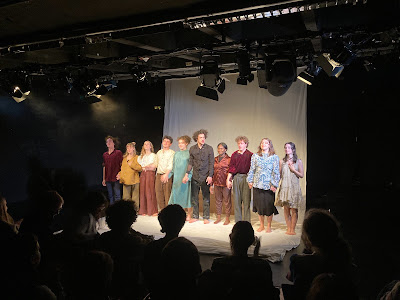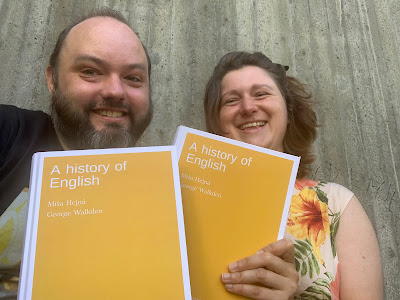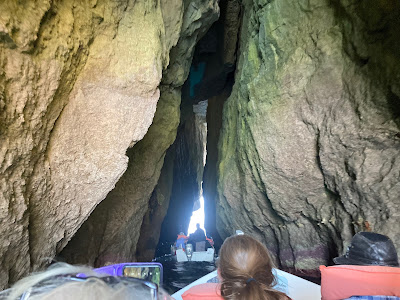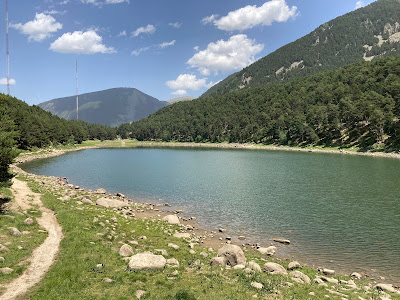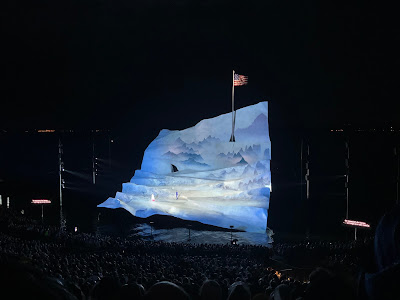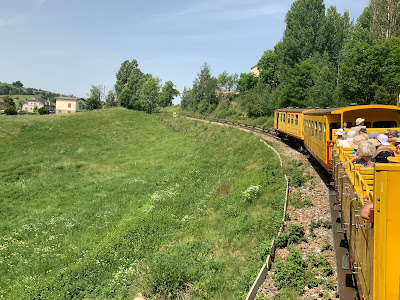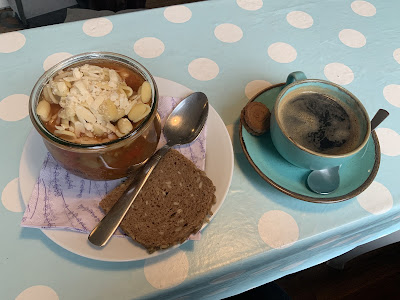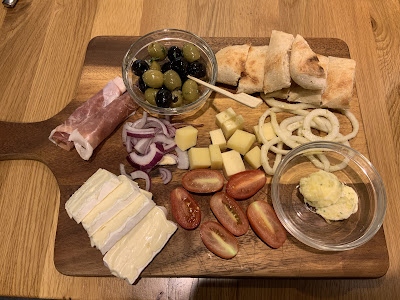2022 wasn’t a particularly book-filled year for me. I read 35 books, which is fewer than in any year since 2017. That makes 237 books read since the start of 2018. But I’ll jump straight in with the mini-reviews.
Bridget Collins, The Betrayals
I certainly wasn’t expecting my first book of the year to be as good as this. Hermann-Hesse-inspired with touches of Gormenghast, and with a hissing and sizzling romantic tension throughout. Just incredibly good reading.
Private Eye Annual 2021
Good to see the Private Eye keeping up its satire efforts through the continuing pandemic.
Samuel Isaacson, The Altimer
A choose-your-own-adventure book - the first of those to have featured here in a while! Fun and well-constructed sci-fi narrative around a space mission gone wrong. Sometimes you get punished for apparently innocuous choices, such as opening a door cautiously rather than incautiously. And the chances of getting to the end without dying and having to restart are pretty much nil - but that does give it more replay value.
Patrick Rothfuss, The Name of the Wind
Much-recommended fantasy novel. Reads a bit like the story of someone trying to level up in all the D&D classes at once. Hardly mould-breaking, but definitely enjoyable. Extra note: either Kuang’s Poppy War (read last year) is derivative of this book, or both are derivative of something else, because the setup of the academy/university is very, very similar.
Stephen Booth, The Kill Call
Another murder mystery set in the Peak District, this time even closer to home for me. The characterization shines through in this book in a way it didn’t in Scared to Live, but the plot feels more disjointed, without much in the way of tension.
Albert C. Baugh & Thomas Cable, A History of the English Language (6th edition)
I don’t think there’s much excuse for anyone to be using this book to teach from in 2022. It has undergone expansions and changes over the years, but the result is incoherence and contradiction: for instance, there’s a nuanced debunking of outdated ideas about parataxis and hypotaxis on pp63-64, but the myth is then repeated on p238. It’s replete with long lists of borrowed words, and some weird sidebars (e.g. discussion of the early history of transformational grammar in the mid-20th century, in the chapter on American English). In view of the widespread availability of more up-to-date, pedagogically sounder alternatives, it should probably be used only for its historical interest.
Franco Moretti, The Way of the World
A book about the Bildungsroman, its core features, and the development of the genre. I read this as part of a project on reading the history of English as a Bildungsroman. It’s persuasive, but in that odd way that works of literary theory often are, with an accumulation of erudition and verbiage leading to a conclusion rather than anything that would normally qualify as argumentation.
The Dragon of Icespire Peak
This is by far the least interesting D&D adventure I’ve taken a look at. It seems like it’s just a collection of sidequests, with no real plot or coherence. The encounters look well-crafted, but that on its own isn’t enough to make me want to put characters through this. Perhaps it can be cannibalized for other adventures.
Jack Kerouac, On the Road
For the first two thirds of this book, I just despised the protagonists, Sal and Dean and all the rest. In the last third that was mingled with no small amount of pity. I think I was expecting something more life-affirming than pathetic, but it certainly has powerful moments. Perhaps it’d mean more if I’d been to any of the places in the book.
Erin Morgenstern, Starless Sea
This odd, dreamlike book is both derivative and very cosy/cutesy - circumventing both of these criticisms in a way by leaning into them. It’s fun and nicely written, but oddly paced. Enjoyable rather than life-changing.
The Dark Crystal Adventure Game
A beautifully designed and produced volume - it’s a shame that care didn’t extend to the proofreading, where there are lots of errors, some of which impede comprehension. I’d love to play a game of this some time, though I have concerns about the gameplay dynamics: getting less effective as you’re injured, while realistic, might hamper fun, and acquiring skills looks to be very expensive in terms of experience (“guess I’ll hang on to two sessions’ worth of experience in case I run into a random NPC”). There’s lots of thoughtful world-building.
Gretchen McCulloch, Because Internet
I was expecting this to be good pop linguistics, and was also forewarned that it contains good linguistics in general. It’s both of those things: clearly and engagingly written, and the new proposals - e.g. emoji as analogous to gesture - are convincingly argued for. It’s also a trip down memory lane. My favourite chapter was the one taxonomizing different approaches to using the internet, in which I learned that I’m an Old Internet Person, having cut my teeth on Usenet, forums, MUDs and hand-coded HTML in the mid-nineties (though within this group I’m a comparative spring chicken). It’s fitting that this review will be posted on my blog, which has been in continuous operation since 2004.
Peter Hartmann, Zur Lage der Linguistik in der BRD
This little book is an overview of the state of linguistics in (West) Germany in the years leading up to 1972. Reading it exactly 50 years later is as interesting for what hasn’t changed as for what has; in particular, the fact that German linguistics is still structured around philologies, Lehrstühle, and other such silliness is really inexcusable given that people were rightly criticizing this setup fifty years ago. Hartmann’s prose isn’t exactly scintillating, and the book is most valuable for its little tables describing the situation at different universities.
Celeste Ng, Everything I Never Told You
Powerful novel about being an Asian American in the 1970s US. Tragic, pessimistic and compelling.
Giorgio Francesco Arcadia & Bianca Basciano, Chinese Linguistics: An Introduction
Reading this taught me a lot of stuff, including that I knew more about Chinese linguistics than I thought. It’d be fun to try to teach a course from it some time. On the minus side, the structure is sometimes a bit random and there are a lot of infelicities of English (“as e.g.” throughout).
Kazuo Ishiguro, Klara and the Sun
After a fantasy novel, Ishiguro now turns his hand to cyberpunk/sci-fi. Though nothing about the plot is hugely original, this is a touching story about loneliness and grief.
Bertolt Brecht, Der kaukasische Kreidekreis
Not what I was expecting - an irreverent, fairytale-style story set in Georgia. Would like to see it on stage some time.
Ian Roberts & Anna Roussou, Syntactic change: a Minimalist approach to grammaticalization
Re-read, first time since 2009. Like many books known for one claim (“grammaticalization is upward reanalysis”), this book is a lot richer than one remembers. Lots of case studies, mostly from Indo-European (especially Germanic, Romance and Greek), but some from beyond. And interesting proposal at the end about the nature of functional categories.
Monsters of the Multiverse
It’s a D&D sourcebook. It has lots of revised classes in it, and a compendium of new and revised monsters. Fun.
Olúfẹmi O. Táíwò, Elite Capture: how the powerful took over identity politics (and everything else)
This book is a lot less cynical than the title suggests. Táíwò makes the case that identity politics has indeed been co-opted by a capitalist elite, but that this is more or less unsurprising, given that these elites tend to get their hands on everything in exactly this way. Thus elite involvement (while it should be resisted) isn’t a reason to discard the identity-politics enterprise out of hand. Instead, Táíwò suggests that we need to reject “deference epistemology” - a folksy version of standpoint epistemology that demands that we constantly defer to whoever in the room comes out poorest in the privilege calculus. As he points out, this approach neglects the far more important question of who is “in the room” in the first place, and why.
Tim Clare, Coward
I’m tempted to say that this book isn’t for the faint of heart, but actually that’s exactly who it’s for. Clare, normally a fantasy author, takes us through the research around anxiety and panic with a masterful hand. I was expecting a book by a fiction-writer on this topic to be more introspective and less… well-researched? But there’s no doubt he’s done his homework. As well as personally trying everything from CBT and SSRIs to transcranial stimulation and psychedelics, he’s spoken to a dozen leading researchers from around the world. The message I took away from it, with caution, was that many treatments appear to function only in a small subset of anxiety-sufferers - and that suggests (to me at least) that what we call anxiety is actually a myriad of disorders with different aetiologies but very similar symptoms, remaining to be better understood as time goes on.
Thomas Piketty, A brief history of inequality
As Piketty explains in the intro, this is his attempt to write a shorter, more readable book condensing the key ideas of his weightier tomes. It succeeds in that, and, just as when I read Capital, I’m impressed at Piketty’s combination of rich data and humanistic explanatory thinking. More than that, he actually offers concrete proposals for solutions to many problems - mostly amounting to “tax the rich more”, which I’m all in favour of. He does subscribe to a notion of historical progress along specific dimensions, but he doesn’t do so in the aggressively self-congratulatory Pinkerite way, and he’s at pains to point out where that progress has been rolled back in many cases since 1980.
Spelljammer: Adventures in Space
Another D&D sourcebook! This one includes a fantastic adventure, nice and epic and linear, that I will probably run for friends soon.
Carl Zuckmayer, Des Teufels General
Come for the Saxon genitive, stay for the 1946 exploration of loyalty, honour and morality under a fascist regime. This seems to be one of those plays that I can’t really imagine being any good when staged, but which makes for great reading. I also can’t imagine how incendiary this would have been when it came out.
Wu Cheng’en, Monkey King (Journey to the West), trans. Julia Lovell
Another of the four great Chinese novels. This one is just completely insane, and Lovell’s translation is fast-paced, quirky and inventive. My favourite bit is when two male characters get pregnant and need to resolve the situation.
Phil Sidebottom, Pecsætna: People of the Anglo-Saxon Peak District
I was expecting this to be less scholarly, but it’s a full academic treatment by an archaeologist who knows what he’s talking about. Lots of the book is unavoidably speculative, but there are some intriguing suggestions, such as the idea that the area was populated by Britons with a tiny elite of Germanic-speaking overlords, that it changed hands between Mercia, Northumbria and ultimately Wessex too, and that it was later settled by Hiberno-Norse speakers in small numbers. Unfortunately, with the textual record being what it is, we won’t likely be able to learn more that way. And I’m not sure why the author gives so much weight to the geological properties of the limestone White Peak area; why would this correlate with a political or ethnic unit?
Hilda Koopman, The syntax of verbs: from verb movement rules in the Kru languages to Universal Grammar
Written at the height of early Principles & Parameters, this is a cool study of Vata and Gbadi, two languages of West Africa, with interesting things to say about the theory of verb movement in particular - but also verb-second and more.
Manfred Braunger, Blutroter Bodensee: ein Fall für Kommissar Zoffinger
Another in the series of crime novels set in places I’m familiar with. This is not a very good book. Information is released to the reader piecemeal, chapter by chapter, and the consequences of that information are resolved within the same chapter, so there’s never much incentive to read on. And the book also trades on “ooh, Southern and Eastern Europeans are scary” in a way that I find pretty distasteful.
Karl Marx & Friedrich Engels, Manifest der Kommunistischen Partei
Some light bedtime reading.
Peter Auer & Karl Joos, Kleiner Seealemannischer Wortschatz gehoben auf Konstanzer Grund
A little dialect dictionary. (More precisely an “Idiotikon” - a list of words that are different in this dialect.”) Auer put this together based on Karl Joos’s PhD thesis from the 1920s, and it’s also got some cute illustrations. Not normally one to read cover to cover, but it’d be nice to blend in a little more with the locals…
Ruth Ben-Ghiat, Strongmen: how they rise, why they succeed, how they fall
This is a cogent argument that Mussolini, Hitler, Franco, Mobutu, Gaddafi, Pinochet, Putin and Trump (and others) constitute a natural class, a category of personalist strongman rulers whose hallmarks are ethnonationalism, corruption, violence, and the projection of an image of virility. While it’s convincing on that point, I’d have liked to see more on what can be done about them.
Greta Thunberg, No one is too small to make a difference
Thunberg is one of the most fascinating figures of our time - a kind of modern-day Martin Luther, except that rather than 95 theses she has only one: listen to the scientists and stop emissions. This tiny book contains eleven short speeches that make this point over and over again. It’s not encouraging and certainly not comfortable, but certainly necessary. You won’t learn much from it (the details of the science are not the focus), but if it spurs some people to get off their arses and do something, it’s served its purpose.
Elly van Gelderen, Third factors in language variation and change
Keep an eye out for my review of this one in English Language & Linguistics!
Private Eye Annual 2022
It comes round again. 2022 was not an easy year to satirize British politics - and this annual doesn’t even get as far as Liz Truss’s departure from office and the Queen’s death.
James Turner, Philology: the forgotten origins of the modern humanities
A wide-ranging and clearly written history of the humanities, minus its philosophical side. I found it odd that two thirds of the book is devoted to the nineteenth century - precisely the point at which individual disciplines were beginning to hive off from philology and go their own way. Relatedly (and perhaps even because of this) I wasn’t convinced that philology was as unified, and as distinct from philosophy, pre-1800 as Turner implies; it doesn’t do the development of thinking on language justice, at least. And I’m not convinced that the humanities are better off without their disciplinary boundaries, as Turner seems to suggest in the epilogue. But chapter 9 on linguistics, which focuses on Max Müller and William Dwight Whitney, is fun (though a bit partisan in favour of Whitney, in my view).

